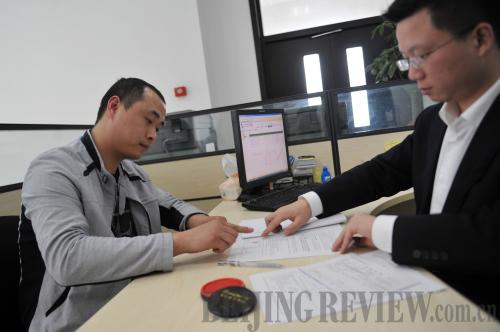|
 |
|
SEALING A DEAL: Zhou Jianhua (left), the boss of a shoe manufacturer in Wenzhou, Zhejiang Province, signs a contract with a micro-loan company (HUANG ZONGZHI) |
Right now, the government is studying the implementation of a file management system for private financing and improvements to the monitoring system.
According to the program, informal moneylenders will be encouraged to register as private lending institutions free to operate with the blessing of the state.
The participation of private capital—in the form of setting up or taking shares of rural banks and credit companies—is encouraged and supported in the reform process. Eligible micro-finance companies could be transformed into rural banks. Private funds will also be guided toward the establishment of venture capital and private equity activities as well as other types of investment bodies.
"The program points out the direction where the private capital should be channeled to. The registration requirement for private capital will turn underground private lending into formal lending above it," said Zhang Yili, Vice Dean of the School of Business with Wenzhou University.
"After private moneylenders are registered as legal institutions, the government can effectively supervise their operations and establish regulations," Zhang Yili said.
As it stands, illegal private banks are weak and collapse easily under the slightest pressure because they have no legal protection.
"Registration is the first step to governmental supervision," said Ma.
The government vowed to encourage the establishment of financial leasing enterprises that serve small and micro-enterprises as well as sectors concerning farmers, agriculture and the city's rural areas. It will also encourage qualified state-owned and share-holding banks to set up special units to deal with credit grants to small enterprises.
According to Fang, financial leasing enterprises are currently only permitted in Tianjin, Shanghai and Guangzhou of Guangdong Province.
"With the establishment of financial leasing enterprises, the private entrepreneurs in Wenzhou will be able to rent the manufacturing equipment from the financing leasing enterprises," Fang said.
Other measures of the pilot program include standardizing and legalizing transactions of non-listed companies' shares, technologies and cultural properties, encouraging small and micro-companies to issue bonds in Wenzhou, setting up guarantee mechanisms for small and micro-companies, and encouraging commercial insurers to participate in the establishment of a social security system.
It's a positive signal, but it's also too early to judge the real effects without specific rules to support the program, said Cheng Huifang, Dean of the College of Economics and Management at Zhejiang University of Technology.
The government will also examine a pilot scheme that will allow Wenzhou residents to make direct offshore investments by creating regular and convenient direct investment channels. If it is approved, Wenzhou will become the first city to allow individuals to directly invest overseas, Zhang Yili said.
According to Chen Derong, Secretary General of Wenzhou Municipal Committee of the Communist Party of China, the financing problem for Wenzhou is not lack of money, but excess liquidity and lack of investment channels. To address Wenzhou's excess liquidity, the city launched an individual overseas investment program last year, but it was suspended weeks later.
Suitable supporting policies are crucial to the successful implementation of the pilot project, said Ding Zhijie, Dean of the School of Banking and Finance at the University of International Business and Economics. Since China's capital accounts are still relatively closed, the pilot project in Wenzhou will be limited to direct overseas investment, but authenticity tests and other regulatory measures remain necessary.
Email us at: liuxinlian@bjreview.com | 